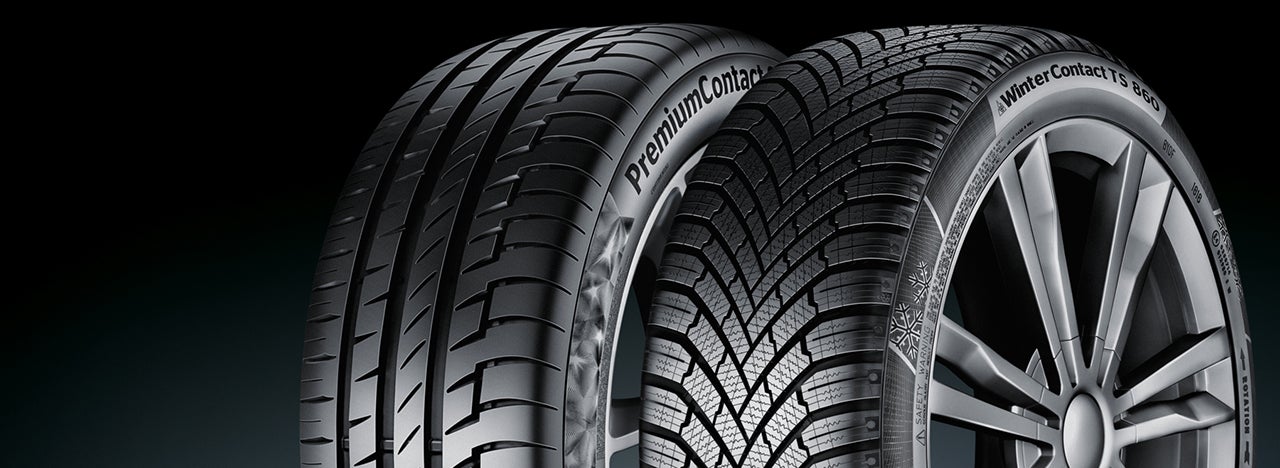
#WinterWorld
Winter tyres vs. all-season tyres
Selecting winter or all-season tyres for your vehicle
Whether you need winter or all-season tyres depends on many factors, including:
- Where you live
- Your local weather conditions
- How low the seasonal temperature drops
 All-season or winter tyres? It depends on where your live, your local climate and your average mileage
All-season or winter tyres? It depends on where your live, your local climate and your average mileage
A common question tyre professionals often get asked is, “do I need winter or all-season tyres?” Unfortunately, there is no black and white answer because there are many variables to consider, such as your local legal requirements, your local climate, how often you drive and your budget. In general, all-season tyres also offer high levels of safety and performance in moderate climates but let’s take a closer look at tyre considerations that will help you decide.
Winter tyres vs. all-season tyres for your location
Most European countries have their own regulations when it comes to winter tyres (aka. snow tyres). For some countries, winter tyres are recommended, for others they are required by law. The first step to finding the type of tyre you need is finding out whether winter tyres are a legal requirement. You can find out whether winter tyres are mandatory in your country here. If you do live in a region where winter tyres are compulsory, you could face severe penalties if you don’t have them. In that case, choosing winter tyres will be an easy decision.

Winter tyres vs. all-season tyres for the weather conditions
If your local law says winter tyres are recommended but not mandatory, you need to make your own decision on the type of tyres you need. You may be able to decide by answering this question: Does the temperature often get low in winter? Then it may be safer for you to switch to winter tyres for the season. They are made from a custom rubber compound that stays soft and flexible in low temperatures, which provides better traction. The enhanced tread pattern will also help you get through packed snow, slush and icy conditions. If the temperatures never go that low, tyres designed for all-season conditions may be a great option for you. They combine key elements of both snow and all-weather tyres, which means they provide reliable grip in rainy, wet and mild winter conditions.
Winter tyres vs. all-season tyres for your average mileage
If you only use your car occasionally – perhaps for short shopping trips, going to work and visiting friends and family in urban locations – swapping tyres twice a year may not be worth the cost, time and effort. Tyres for all-season conditions could be an alternative. However, if you use your car often – especially for trips away, into remote locations or colder regions – swapping to snow tyres is usually the safer option.
Still undecided? Find out more about the differences between winter and all-season tyres below.
When do you need winter tyres?
You should swap from summer to winter tyres when the temperatures are regularly low. Our winter tyres are made of a custom rubber compound that stays soft and flexible in low temperatures for better traction and handling. They provide enhanced braking performance in snowy and icy conditions and feature an aggressive tread pattern for greater traction. Learn more about why tread depth in winter tyres matters. Additionally, our winter tyres are put through additional tests, to ensure optimum performance in cold weather conditions.

When do you need all-season tyres?
All-season tyres are developed to perform all year round in moderate climates. Our all-season tyres are designed to offer impressive grip on both summer and winter roads and good braking performance on dry and wet roads. The main advantages of all-season tyres are the savings – money, time, and the effort of seasonal tyre changes. However, always remember that our winter tyres are specifically tailored to the conditions in places that experience cold winters and seasonal conditions like snow and ice, which all-season tyres were not designed for.
The tyre verdict...
When deciding whether you need a tyre for winter or all-season conditions, keep these two key considerations in mind:
- All-season tyres can be used all year round and work well in mild winter conditions, but do not have the same winter-specific features as winter tyres, so their performance in harsh winter weather is not as good.
- Winter tyres should not be used in summer, but they are perfectly suited to dealing with the specific challenges of winter driving.
Related content
-
 2024/10/24Summer tyres vs. winter tyresThe weather changes throughout the year, which affects driving conditions on the road; fit your car with tires that will provide you with the most confidence.Read more
2024/10/24Summer tyres vs. winter tyresThe weather changes throughout the year, which affects driving conditions on the road; fit your car with tires that will provide you with the most confidence.Read more -
 2024/10/24Winter tyre lawsLearn when you need to switch to winter tires and whether they're compulsory in your region.Read more
2024/10/24Winter tyre lawsLearn when you need to switch to winter tires and whether they're compulsory in your region.Read more -
 2024/10/24Prepare your car for winterEnsure you have the right supplies for the season ahead with our winter car kit checklist.Read more
2024/10/24Prepare your car for winterEnsure you have the right supplies for the season ahead with our winter car kit checklist.Read more